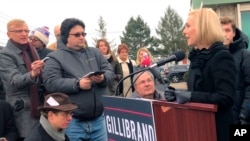A day after she jumped into the presidential race from a glimmering Manhattan television studio, Sen. Kirsten Gillibrand returned Wednesday to her upstate New York hometown to preview a campaign that is expected to put gender front and center.
Speaking outside a Troy diner she said is "a stone's throw" from her family's house, Gillibrand framed the campaign as an extension of motherhood.
"I'm going to run for president of the United States because as a young mom, I will fight for your children as hard as I would fight for my own," Gillibrand, 52, said as she was joined by her husband, Jonathan, their 10- and 15-year-old sons, and her mother, Polly.
That argument could resonate in a Democratic primary in which women will be a crucial voting bloc and comes on the heels of a midterm election that sent a record number of women to Congress.
But Gillibrand, who announced the creation of a presidential exploratory committee Tuesday on CBS' "The Late Show with Stephen Colbert," faces a series of hurdles. She won't be the only woman seeking the White House — Sen. Elizabeth Warren of Massachusetts and Rep. Tulsi Gabbard of Hawaii have already jumped into the race, and several other prominent women are expected to soon follow them. And there are persistent questions about whether — more than two years after Hillary Clinton fell short of the White House — Americans have grappled with sexism and are willing to support another woman running for president.
The first question Gillibrand received at her press conference Wednesday showed the scrutiny she and other women could face, as a reporter said a lot of people see her as "pretty likable." The remark touched on a raging debate about why women in politics are held to a different standard than men regarding their perceived likeability.
First appointed to the Senate in 2009 to fill the seat vacated by Clinton, Gillibrand has been among the chamber's most vocal members on issues like sexual harassment, military sexual assault, equal pay for women and paid family leave. But she angered some fellow Democrats in November 2017 when she said former President Bill Clinton should have resigned after his affair with White House intern Monica Lewinsky. She was also the first prominent Democrat to call on her Senate colleague Al Franken to resign after accusations of sexual misconduct from multiple women.
She defended her actions on Wednesday.
"I just couldn't stay silent," she said, referring to Franken. "My job was not to stay silent. I couldn't defend it, and I had to do what was right. And if some wealthy individuals, that makes them angry, that's on them."
While Gillibrand's forceful advocacy for gender issues could help her stand out in what is expected to be a historically crowded field, she will also face questions about her ideological evolution. Gillibrand first ran for office in 2006, defeating a four-term Republican incumbent in a conservative congressional district, a victory she readily touts today. She was a centrist Democrat who joined the Blue Dogs and had an A rating from the National Rifle Association during her time in the House. She has abandoned many of those early, more conservative positions during her Senate tenure.
Asked to square her past stances with her record today as one of the most liberal members of the Senate, Gillibrand said she would tell voters to "look at my heart" and that "it's important to know when you're wrong, and to do what's right."
As she campaigned for her second full term in the Senate last year, Gillibrand pledged she would serve out her six-year term if re-elected. Pressed Wednesday on what had changed, she said she had been moved by the "urgency of this moment," and that it called for taking on Trump "directly."
Gillibrand has been among Congress's most prolific fundraisers, raising more than $56 million during her career, including more than $20 million from 2013 to 2018, according to aides. That's helped her build a war chest but has also prompted criticism for being too close to Wall Street, especially following recent reports that she sought to gauge the interest of donors from the financial industry before launching a bid. She said Wednesday that those reports are not true.
"I think it's important for people to know that my values are never for sale," she said, adding that she has banned money from corporate political action committees and will not take contributions from federal lobbyists.
Gillibrand's fellow New York Democrat, Gov. Andrew Cuomo, said earlier this month he believed former Vice President Joe Biden had the "best case" for the Democratic nomination because he has "the secret ingredient you need to win, which is credibility."
Asked Wednesday if she planned to try to change Cuomo's mind, Gillibrand appeared undeterred.
"I intend to try and change everybody's mind," Gillibrand said with a smile, adding that everyone is entitled to their own opinions and that Biden is "an amazing guy."
"I know a lot of people who love and respect him, and I'm one of them," she said.
Gillibrand will base her presidential campaign in Troy, a move that could highlight her roots.
"I want to be here because this is where I'm from, because this is my story, because this is who I am," she said, adding that like many other places in America, Troy has had its "ups and downs."




